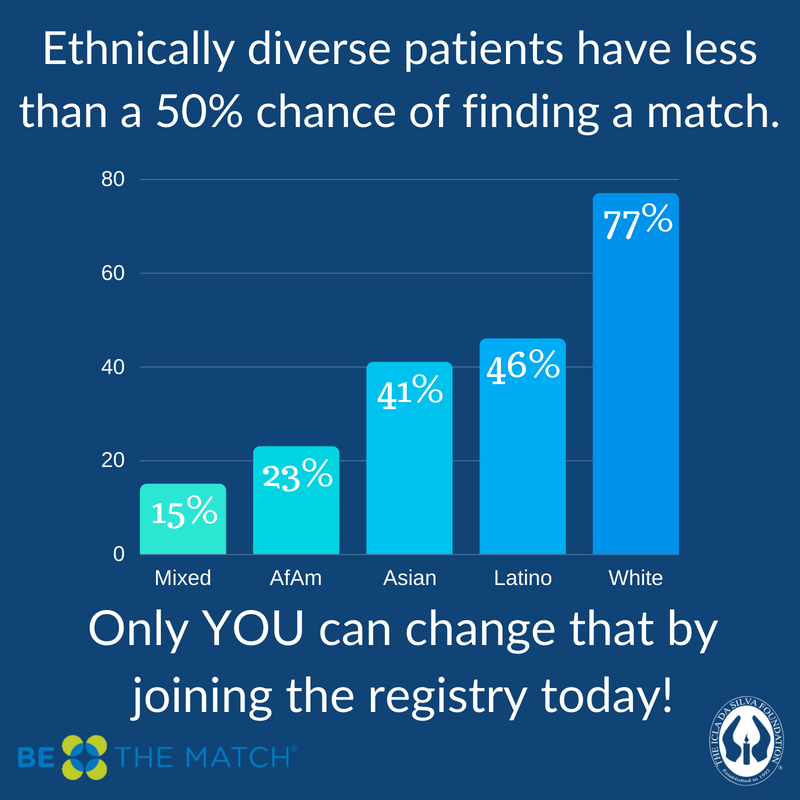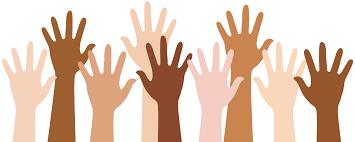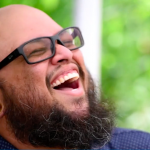 David Gonzales shares his story from Centro Church in Dallas, Texas.
David Gonzales shares his story from Centro Church in Dallas, Texas.
David has Hodgkin’s Lymphoma, recurring 4 times in his life. He has undergone 415 days of chemo and radiation and he is currently in remission.
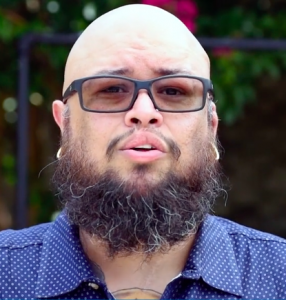
Despite his disease, he still smiles. He is living his life and he continues to support his community by holding bone marrow drives with the Icla da Silva Foundation.
Hispanic and Latino persons who are suffering from various blood cancers, only have a 23% chance of finding a matching donor. A 23% chance at a life-saving cure.
There simply aren’t enough Latinos included on the registry.
A matching bone marrow or stem cell donor is the only cure for many patients.
Together, we can increase the likelihood of finding a match by asking as many people as possible to join the Be The Match registry.
Watch the short video below where Dave shares his story. After you join the registry, share with your family and friends so they may also join the registry. Help us change the odds…help us save more lives.
Written by Bret Itskowitch, special thanks to Andres David Lopez for shooting and editing.
Surviving Cancer While Being Ethnically DiverseCelebrating Diversity
We live in a world that is becoming more ethnically diverse. This diversity makes every one of us richer in experience, knowledge, and understanding. Every day we observe different cultures, practices, foods, and religions. We recognize people for who they are, with different skin color, dress and speech.
We understand that diversity makes each one of us unique.
We celebrate it. We honor our heritage and our own ethnic background. We tell stories and share traditions with our sons and daughters, and we reflect on the uniqueness that makes us who we are.
The Challenge
For patients suffering from a blood cancer like leukemia, lymphoma or sickle cell, being ethnically diverse can challenge their survival.
70% of patients in need of a bone marrow or stem cell transplant, do not have a matching donor in their family. As a result, they rely on the NMDP registry, managed by Be The Match, to find a potential donor, a matching donor.
The best chance for a match is to find someone of similar ethnic ancestry who is willing to donate stem cells or bone marrow.
Unfortunately, many ethnicities are currently underrepresented on the registry, making it more difficult for those patients to find their match.
The Icla da Silva Foundation focuses on adding more ethnically diverse donors to the Be the Match registry. We strive to educate and inform more people about the importance of adding yourself to the registry and giving more hope to patients who are searching for a potential donor.
Answering The Challenge
There are 3 common questions regarding becoming a potential donor and giving a patient a second chance at life.
A. Is It Difficult?
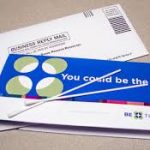 Joining the registry to be included in patient searches is easy. Click any of the links on this page, set up an account with email and password, and answer a few questions. A swab kit will be sent to your home. Once you swab the inside of your cheek and return it to Be the Match, you are entered into the registry and included in patient searches.
Joining the registry to be included in patient searches is easy. Click any of the links on this page, set up an account with email and password, and answer a few questions. A swab kit will be sent to your home. Once you swab the inside of your cheek and return it to Be the Match, you are entered into the registry and included in patient searches.
Everyone should do it.
The total registration process takes about 8 minutes…10 minutes if you type slow like me.
B. Is It Scary?
 There has been a lot of misinformation about bone marrow donation in movies and popular culture.
There has been a lot of misinformation about bone marrow donation in movies and popular culture.
None of it is true.
There are two ways to donate bone marrow, (1) the more common PBSC method, performed at an outpatient clinic, and (2) a donation performed surgically, at a hospital.
- 80% of donors make their donation through PBSC (stem cell donation), which is a non-invasive outpatient procedure. PBSC donors receive daily injections of a drug called filgrastim for five days, to increase the number of blood-forming cells in the bloodstream. Then, through a process called apheresis, a donor’s blood is removed through a needle in one arm and passed through a machine that separates out the blood-forming cells. The remaining blood is returned to the donor through the other arm.
- 20% of donors do so with a surgical procedure done under general or regional anesthesia in a hospital. While a donor receives anesthesia, doctors use needles to withdraw liquid marrow from the back of the pelvic bone.
C. Is It Expensive?
The cost to donate bone marrow or stem cells is 100% free and doesn’t utilize your insurance. Be the Match will make sure that you have everything you need to donate. Whether it’s a ride to a transplant center, a letter explaining your donation to your employer, or help with childcare, Be the Match will be there for you.
Consider A Simple Solution
Join the Registry
Everyone can become part of the solution by joining the Be The Match registry. Inform your family and friends about the importance of adding themselves to become potential donors. You may become a life saver to a patient in need, a patient who does not have a match.
What would you do if you were faced with the challenge of dealing with a blood cancer like leukemia or sickle cell? Where would you go to search for a matching donor? How would you find someone who shares a similar ethnic background to you? There are over 14,000 patients who currently need a matching donor. Many will not survive because they can’t find someone like them, someone like you.
Remember, ethnically diverse patients are not well represented on the registry. If you are ethnically diverse, you are the only one who can change this fact.
If you have already registered, thank you. There are other ways that you can help us add more diversity to the registry.
Host A Drive
Are you involved with a group or organization that is ethnically diverse? Join forces with us and host a donor drive at your school, work, or social organization.
We do all of the work, you just have to make the introductions.
Volunteer
You can also volunteer, and work with us to make our donor drives bigger, better and more inclusive.
The Donation Process
Do you still have questions about the donation process?
Please join the registry and give greater hope to patients in need, it’s their only chance for survival.
Remember, you may be someone’s cure.
Sign Up. Save a Life.
Written by Bret Itskowitch
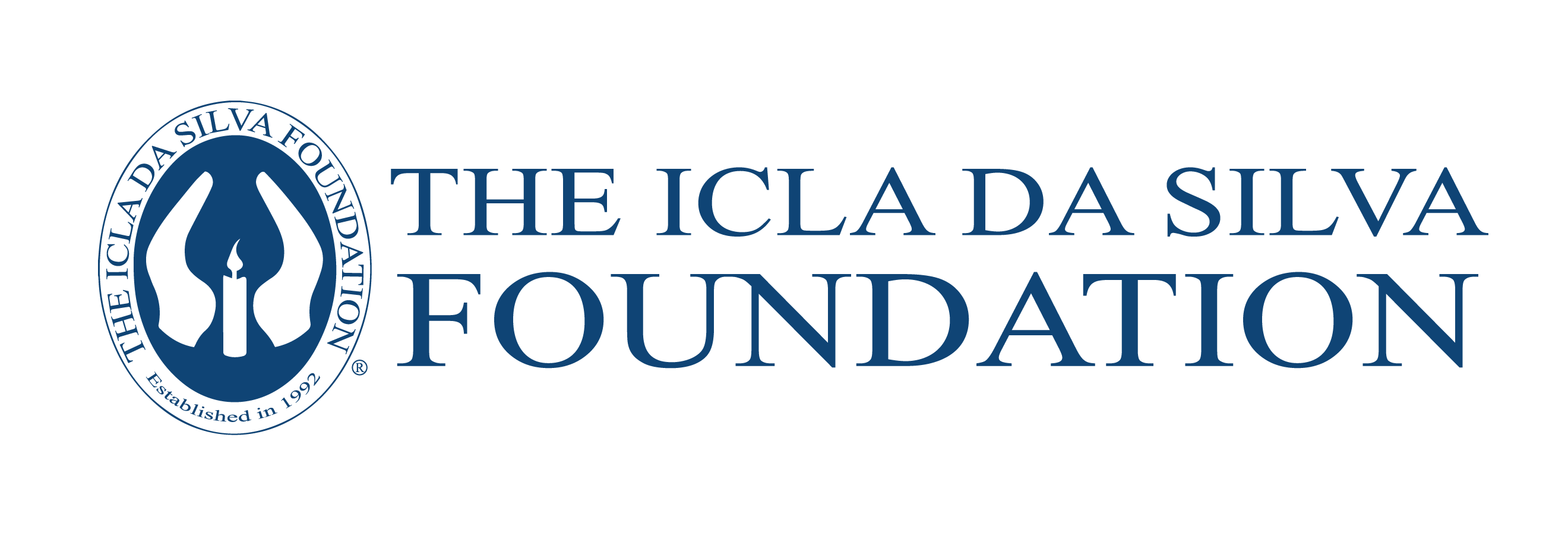
 English
English Spanish
Spanish Portuguese
Portuguese
